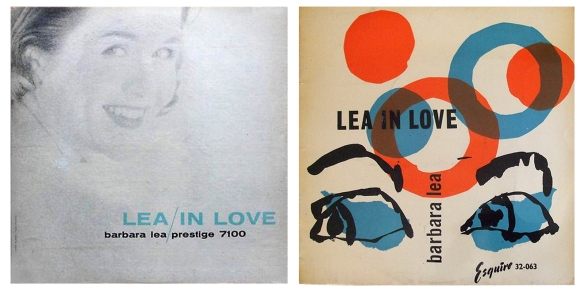Tad Richards' odyssey through the catalog of Prestige Records:an unofficial and idiosyncratic history of jazz in the 50s and 60s. With occasional digressions.
Monday, January 02, 2017
Listening to Prestige 226: Barbara Lea
April 19 was a busy day at the Van Gelder studio. After Mal Waldron's sextet had finished up, Barbara Lea came in with a trio and recorded four songs, only two of which ever made it to vinyl. Had to say why. The unissued two were "Aren't You Glad You're You?" and "Ain't Misbehavin'," and a good singer, two good songs...what could have gone wrong?
She was back a week later to record a bunch more, this time with a septet. The link between the two dates, besides Lea, was Dick Cary, who had also played on her first two Prestige sessions. Not so surprising: you get a good accompanist, like Cary, and you want to keep him at the keyboards where he knows what you want and how to give it to you. A little more surprising: Cary played the piano on this session, but a very different instrument on the others.
Her sessions of the previous fall covered two days, and on the first one he played the little heard (and not very imaginatively named) alto horn. The piano player was the not very imaginatively pseudonymed Richard Lowman, otherwise known as Dick Hyman, who certainly would not be the low man on anyone's totem pole, but for whatever reason was not back the next day, so Cary doubled on alto horn and piano. And for Lea's final Prestige outing, a week after this one, Jimmy Lyons took over on piano and Cary went back to the alto horn. Barbara Lea's Prestige albums were also released in England on the Esquire label, where they might have identified Cary's instrument by its British name, the tenor horn.
Lea was riding high in 1957. She had won the Down Beat International Critics' award for Best New Singer in 1956. She was a little off the beaten path for Prestige, leaning more toward traditional than modern, but she was always worth listening to.
Both of these songs were included on the Lea in Love album. She sings "Autumn Leaves" in both the original French and the later English version, honoring two writers of distinction: the French poet Jacques Prevert (also the author of the screenplay for Les Enfant du Paradis) and Johnny Mercer.
A poem by Prevert was the inspiration for a poem of mine which was also set to music, by Fred Koller, so I'll toss that in here too.
Subscribe to:
Post Comments (Atom)


No comments:
Post a Comment